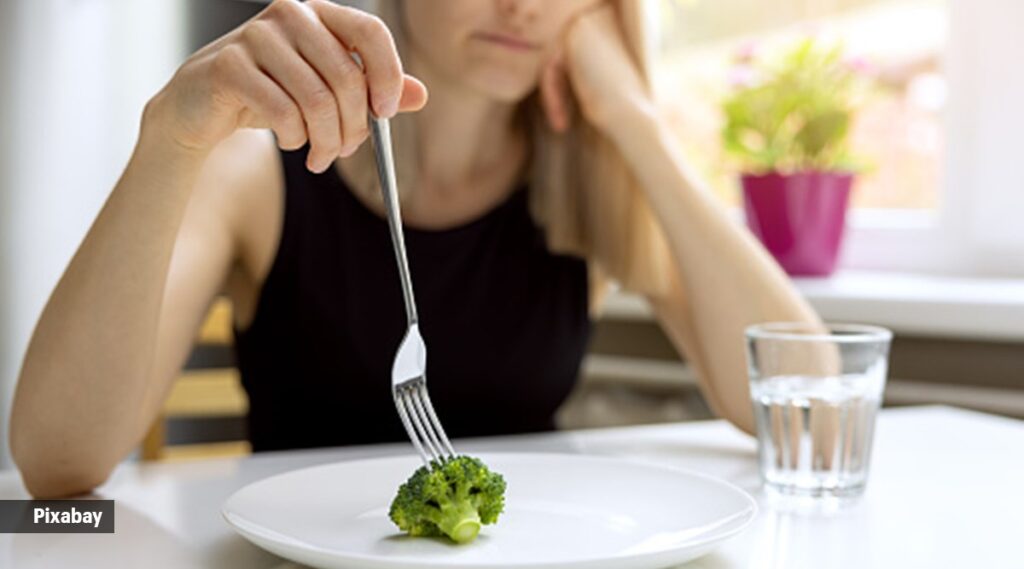Kritika Ghai was first diagnosed with binge-eating disorder when she was merely 12 years. Since birth, she had an enlarged adenoid that blocked her nose pipe, making her gain weight. Her suffering was further exacerbated by her inability to perform any kind of exercise, owing to her irregular breathing patterns. As such, as a child, she was put on various extreme diets to manage her weight. This forced her to eat large amounts of food — rapidly and secretively. “Not knowing what I was going through, eating became a way to validate my emotions,” she said, adding that the pandemic-induced anxiety only led to her eating even more food during stressful and lonely times.
Finally, she consulted a nutritionist who helped her develop healthy eating patterns. Ghai was advised to not curb her cravings and eliminate the difference between ‘good’ and ‘bad’ food in order to stop associating eating with guilt and shame. “I started seeing my body as a structure that supported me and this perspective enabled me to develop a healthy body image,” she said. Finally, after years of battling with this binge-eating disorder, she has developed a healthy relationship with food by eating regular meals, exercising and food-mapping, a technique which involves charting your daily meals in a journal to keep a track of what you’re eating.
Similarly, Pranshu Mishra developed binge-eating disorder due to polycystic ovarian syndrome (PCOS), stress, and an excessive study load in eleventh grade. “You just don’t stop at one single serving; you just mindlessly eat even if you feel discomfort,” Mishra said, calling eating disorders “a tug of war between the stomach and brain”.
While eating her favourite food induced happy hormones in her body, she would feel immense guilt immediately after consumption, leading her to starve herself for hours before repeating the same cycle, she admitted.
Ann, on the other hand, developed bulimia — a serious eating disorder marked by bingeing, followed by methods to avoid weight gain — in 2007. “I have been a chubby kid all my life because of which I faced a lot of bullying. It reached a point where people made snide remarks like ‘do people in your house get to eat food or do you eat it all?’ or ‘go for a walk.’ This massively affected me, and I stopped eating in front of people,” she told indianexpress.com. Owing to her condition, she used to excessively work out which made her lose weight drastically. “I felt very weak and light-headed all the time,” she said.

To understand more about the mental and physical aspects of such eating disorders, we reached out to experts, who emphasised that these disorders are not lifestyle choices. Dr Aparna Ramakrishnan, Psychiatry Consultant, Kokilaben Dhirubhai Ambani Hospital, Mumbai said, “Eating disorders are complex disorders associated with significant disturbances in an individual’s eating behaviours and related thoughts, emotions and attitudes which impair their physical, psychological health and psychosocial functioning. They can often be life-threatening.” She highlighted that the exact causation is elusive, but eating disorders are caused by a complex interaction of genetic, biological, behavioural, psychological and social factors.
Agreeing, Dr Meghana Pasi, Nutrition Consultant, MyThali Program, ArogyaWorld said, “Societal and peer pressure to achieve unrealistic body standards as well as people with low self-esteem and impulsive behaviour are at risk of developing eating disorders.” The expert said that nutritional counselling, psychotherapy and medications are some available treatment options.

Implementing these, Mishra sought nutritional advice from a dietitian who asked her to eat at regular intervals and practise mindful eating, a technique which makes you pay closer attention to your food and how it makes you feel, thereby helping you distinguish between physical and emotional hunger. Alongside, she also included physical activities such as swimming, yoga, and exercise in her routine which made her feel better about her body. “Earlier, people used to body shame me and call me different names, but after developing self-confidence, I am able to ignore their nasty remarks,” she said.
As for Ann, running was what changed her life for the better as it became a mechanism for her to lose weight in a healthy way, helping her achieve mental peace.
Does social media affect eating disorders?
 Social media plays a huge role in our relationship with food. (Source: Freepik)
Social media plays a huge role in our relationship with food. (Source: Freepik)
Talking about the same, Dr Ramakrishnan said, “Exposure to media like fashion magazines, television and social media mediate thin-ideal internalisation and can be associated with the development of eating disorders. More time spent or frequent use of social media means more exposure to images, messages and peer interactions which can propagate body stereotypes.” She further explained that inaccurate visual media representation like the use of filters on photos and videos can raise the risk of eating disorders.
Moreover, after analysis of videos and chat groups across social media platforms, there is a worrying presence of ‘pro-ana’ and ‘pro-mia’ content which focus on anorexia and bulimia being lifestyle choices (that are to be respected) rather than being categorised as disorders, Dr Ramakrishnan said.
Agreeing, Dr Dinika Anand, Clinical Psychologist, BLK-Max Superspeciality Hospital said, “Social media plays a huge role in our relationship with food. On one end, social media projects the ideal body type and size, and on the other end, it glorifies and celebrates food through advertisements and food bloggers.”
The experts stressed that women are more likely to be affected by social pressure and unfavourable evaluations of their physical appearance. Moreover, gender stereotypes, especially the objectification and sexualisation of women, contribute to the emergence of eating disorders among them. Research published in The Journal of Treatment and Prevention in 2012 concurs with this claim as it showed that men are less likely to be diagnosed with an eating disorder even when they exhibit the same symptoms as women because eating disorders are considered generally ‘female’ disorders.
Here are some tips by experts that can help manage eating disorders:
*Keep meals on track
*Eat small portions of meals throughout the day
*Stop starving
*Do not restrict your urges
*Delete or limit the usage of food delivery applications
*Scroll through social media mindfully by engaging with body positivity and relatable content instead of unrealistic and curated feeds
📣 For more lifestyle news, follow us on Instagram | Twitter | Facebook and don’t miss out on the latest updates!

